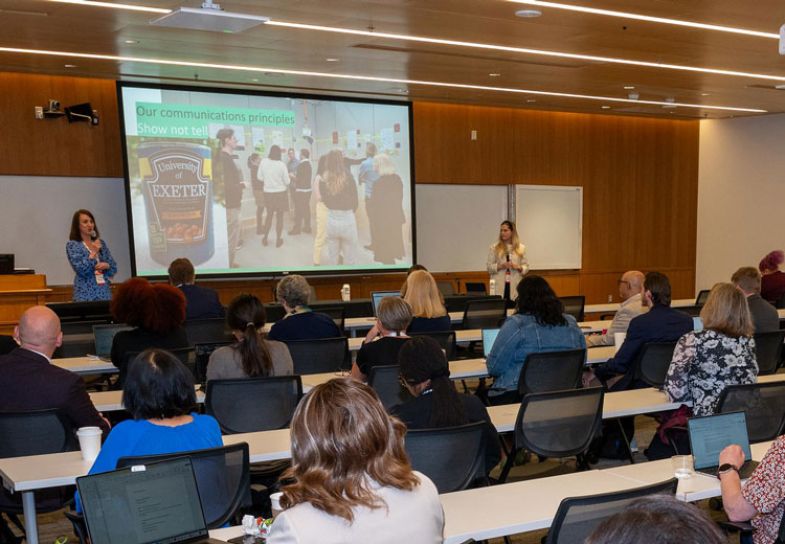
The University of Exeter is inviting students to participate in the development of new products, services and their comprehensive digital strategy
For universities to realise their digital strategies they must encourage input from all members of the academic community. This is fundamental to the University of Exeter’s approach to digital transformation, where co-creation is at the core of new digital initiatives.
“We’ve set out to be the most accessible and connected university destination for any user,” said Helen Cocks, head of digital strategy and engagement at the University of Exeter, during a session held in partnership with the university at the 2024 THE Digital Universities US event. “For us, ‘users’ means the students using our digital tools, but also the staff, faculty and researchers who use those same tools – anyone that has a relationship with the university.”
A three-month period of user research formed the basis of the University of Exeter’s new digital strategy, encompassing internal stakeholders, other universities and industry partners. Based on the information gathered during this period, the university decided to focus on three areas: improving the university experience, ensuring they add value and boost efficiency. This sparked the idea of the digital “account for life”, said Cocks.
“The account for life is where we focus on the delivery of our digital strategy,” Cocks explained. “We came up with 12 strategic themes to keep us on track. One of the most important was placing the university at the centre of an individual’s engagement for life, not just during their time studying.”
However, engaging with students can be difficult – which is why the University of Exeter has adopted a user-led approach. One of the ways the institution achieved this was by “showing, not telling” to immerse users in the work being undertaken at the university. “We considered our digital strategy as a product,” Cocks continued. “[We thought about] what ingredients it has and what benefits it bestows on its consumers. So, we ‘productised’ our digital strategy before taking it to events to share with our audiences.”

Instead of presenting users with a long document outlining its digital strategy, the university’s novel approach made its initiatives more relatable and appealing to users. “We took an agile approach to communications,” said Scarlett Yeo, digital communications advisor at the university. “This meant telling a story as it was unfolding, bringing our users on a journey with us and being completely open and honest about every stage of the process. A good example of how we did this was our fortnightly digital demo sessions.”
The university was experimental in the delivery of its digital strategy. Its TikTok channel and its bespoke game, Magpie, are examples of innovative thinking that has delivered positive results in terms of user engagement. “We launched the Magpie game almost like a digital escape room, which had been designed and built around the behaviours and the values of our digital strategy,” said Cocks.
The university also focused on student-led communication. It hired a team of student communications and engagement assistants to generate ideas for its digital channels and shape key messaging. “We shared our digital strategy with the team but it’s ultimately their story,” Cocks said. “They are not being paid to say what we want them to, they are sharing their genuine experiences of using our digital products and services.”
The university has also developed a user-led app and its own digital hub, operated by student ambassadors. “It's about making sure every product and service we offer is relevant to students and improves their experience,” Cocks said.
The speakers:
- Helen Cocks, head of digital strategy and engagement, University of Exeter
- Scarlett Yeo, digital communications advisor, University of Exeter
Find out more about the University of Exeter’s digital strategy.

